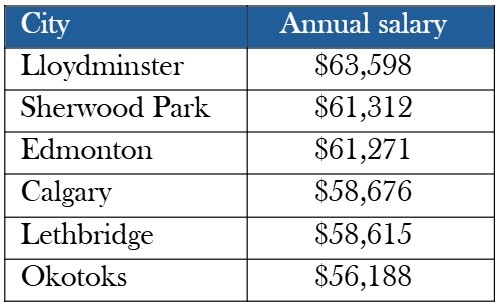

The career of an insurance broker lies in a sweet spot of being an important financial advisory role and a critical provider of insurance for consumers. This career is a viable option for those seeking a stable but dynamic industry that offers not just a stable income, but also opportunities for growth, learning, and achievement.
Speaking of dynamic, Alberta is still considered one of Canada’s still-growing provinces. This is mainly due to its diverse industries, resulting in strong economic performance. Alberta still holds a position in contributing to national economic activity and growth, so it’s a highly urbanized province – making it a terrific market for insurance.
That’s why this guide focuses specifically on becoming an insurance broker in Alberta. For those interested in the opportunity of having a stable, fulfilling, long-term career as an insurance broker here, this article is for you. In this guide for how to become an insurance broker in Alberta, we’ll tackle questions like:
Let’s dive right in and get to know about how to become an insurance broker in Alberta and its pertinent related topics.
An insurance broker mainly works as an intermediary between insurance companies and their clients. It’s their job to assess their client’s needs and circumstances, pore through the different insurance products, then recommend those that suit their client’s needs best.
What you may not be aware of is that an insurance broker is also obligated to work in the best interests of their clients. Technically, insurance brokers can also serve as financial advisors, as they can recommend to individuals, families, and businesses on how to best manage their risks with insurance products.
As with most of the provinces or territories in Canada, there are no formal educational requirements for how to become an insurance broker in Alberta. Typically, an aspiring insurance broker in the province needs to have at least earned their high school diploma or GED equivalent.
While these are the absolute minimum educational requirements, there is no rule that says an insurance broker candidate cannot have a university degree. A degree is not mandatory but having earned one can be valuable, regardless of whether you want to become an insurance broker, insurance agent, or claims adjuster.
Some degrees can equip you with the foundational skills and knowledge that can give a good head start on becoming familiar with the insurance industry. Having a degree can also help you stand out among other applicants if you want to work in one of the largest insurance companies in Canada, for instance. Here are some courses that can help you with your insurance career and enhance your employment prospects:
Licensing in Alberta for insurance brokers is very similar to other provinces. There is a regulatory body that oversees the process. This includes setting the licence qualifications, managing the licensing exam, and approving or disapproving applications.
The Alberta Insurance Council (AIC) is the licensing authority for those who want to become a broker, agent, and adjuster. Here’s a step-by-step process for those new to the insurance industry to become a broker in Alberta:
The crucial first step is to find a course provider approved by the General Licensing Qualification Program (GLQP). You can choose from a variety of study formats, ranging from an online self-study Alberta Level 1 course to a week-long, in-person or virtual classroom training sessions.
There is a myriad of course providers available, so you can be overwhelmed by the different choices. You can use our guide to find the insurance broker course that works for you. After taking a certified course, you should receive a certificate of completion that allows you to register for the General Insurance Licensing exam with the AIC.
After successfully completing a course, you should be ready to take Alberta’s provincial licensing exam. Once you’ve passed the AIC General Insurance Licensing exam, get ready to submit your license application to the AIC and pay the appropriate application fees. Take note that the validity of your grade lasts for only 12 months after passing the exam.
In Alberta, it’s required for aspiring insurance brokers to secure employment and get sponsorship from a licensed employer, which can be an insurance agency or insurance company. The AIC requires that these types of employers recommend your license.
Before submitting your application, make sure that you have all the documentation required for your application. This includes:
Keep in mind that the AIC does not accept criminal checks conducted by other providers, including Triton, Certn, or Verifications Canada. Should you have your background check done at a local police station or the local RCMP detachment, provide a PDF of the report when completing your application.
US residents who wish to apply for a broker licence in Alberta must obtain a background check from the FBI or First Advantage criminal record check. For more information about this process, refer to the AIC FAQ.
After passing the requisite exams and preparing the necessary documents, you may submit your application. Here’s how to apply for your general insurance licence:
Once you’ve submitted your application, all you can do is wait for the AIC to review your application and make their decision. The process usually takes about 15 business days. As soon as the AIC makes their decision, they will send you an email. You may receive these status updates before they make their decision:
Once your application is finally approved, then you may begin practicing as a bona fide insurance broker in Alberta.
To maintain your insurance broker licence, the Insurance Act of Alberta mandates that brokers must devote time for their continued education, or what’s known in the industry as Continuing Education (CE) credits.
Typically, these must be earned every year to maintain your insurance broker licence. You must earn around 15 hours’ worth of CE credits.
The AIC offers three levels of general insurance licences, with each level serving distinct functions and having different educational and exam prerequisites. This differentiated approach ensures that insurance brokers have the necessary knowledge and skills to advance their careers and consistently deliver quality services to consumers.
This is the entry-level licence for insurance brokers in Alberta. Individuals must complete the GLQP course from an AIC-approved provider and pass the Level 1 exam. Once a candidate has passed the exam and obtained this licence, they may work as one of the support staff at an insurance agency or do customer service work under the supervision of a Level 2 or 3 broker.
In Alberta, the Level 1 licence allows brokers to engage in selling property & casualty insurance but under the supervision of a senior broker. Exams for this licence cover risk management, ethics, technical skills, and professionalism to endow licensees with a fundamental understanding and appreciation for insurance principles. As Level 1 licence holders begin their career, they remain under the supervision of a more qualified representative who acts as their mentor and provide continuous learning opportunities.
This licence is the logical next step for brokers wishing to advance their insurance broker careers. Individuals must hold a Level 1 licence for at least one year to be eligible for the Level 2 licence. They must also pass the Level 2 exams within 12 months from the date of their application.
The main advantage of the Level 2 licence is that brokers are allowed to operate independently and manage their own client relationships without direct supervision. Level 2 licence holders have the authority to sell a broad range of insurance products, such as life, property & casualty, and accident and sickness insurance.
These brokers are expected to possess an intermediate level of knowledge in the insurance industry, with risk assessment and underwriting skills as part of their repertoire. Level 2 licenced brokers can take on more complex client requirements and business operations, preparing them for specialized, sophisticated markets or management roles.
Also referred to as the Designated Representative (DR) licence, the Level 3 licence is the highest obtainable level for insurance broker or agent licensing. This designation is often pursued by those wishing to assume management roles or own and operate their own insurance brokerage or agency.
To qualify for this licence, individuals must have the Level 2 licence and hold it for the past two of the three previous years prior to their licence application. They must also pass a comprehensive Level 3 licensing exam or complete an equivalency course within 12 months of applying.
Level 3 licence holders have the skills, knowledge, and responsibility of overseeing operations of an insurance brokerage and ensuring regulatory compliance. These individuals have significant technical knowledge and may work in a managerial capacity, which involves supervising brokers and establishing operational protocols.
Keep in mind that only one individual in an agency can hold the Level 3 licence. In practice, this can ensure that roles and responsibilities are clearly defined, and the brokerage hierarchy has accountability.
This is possible, but with certain conditions. You can obtain your insurance licence in Alberta but will have to satisfy the requirements or conditions set by the other province’s licensing body. While the licensing processes and requirements may seem similar, it does not immediately follow that your Alberta licence will be accepted in other provinces.
Alberta does not have a licence transferring process, meaning that you may have to apply anew for an insurance broker licence in your desired province. In this case, you may also have to fulfill additional educational or testing requirements to practice in another province or state.
When applying for an insurance broker licence in another province, you will likely need to:
Considering that the average salary of a Canadian worker (as of September 2024) is at $65,912 per year or $1,267 per week, the average salary of an insurance broker in Alberta is comparatively substantial.
The average income for an insurance broker in Alberta (as of December 2024) is $86,159 per year or $7,179 a month. Here’s a breakdown of average salaries for an insurance broker in Alberta:

Source: Ziprecruiter
Meanwhile, some of the highest-paying cities in Alberta for insurance brokers include:

Source: Indeed
The short answer: yes. According to a report from the Canadian government, the number of job openings for insurance agents and insurance brokers is projected to reach 40,500 in the period from 2022 to 2031. Job seekers, meanwhile, will total around 50,600.
However, it’s clear that the projected number of job seekers will significantly surpass the projected number of job openings. Retirements of career brokers are expected to comprise half of the broker job openings over the 2022 to 2031 period, much like many of the other job openings in Canada. Job creation from new businesses should account for 38% of the total insurance broker job openings, similar to the projected 37% of all job openings.
Did you find this guide on how to become an insurance broker in Alberta useful? Let us know your thoughts in the comments.
